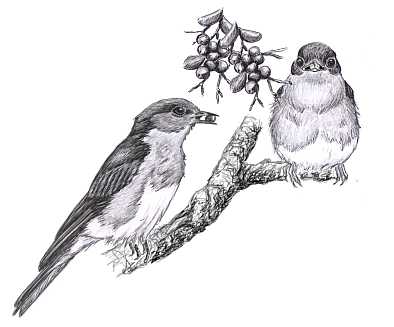
Dear Bird Folks,
This winter I have several bluebirds coming to the feeders in my yard. I’m hoping they will nest in my birdhouses someday. Are the bluebirds that are eating from my feeders now going to be around during the breeding season or are they just here for the winter?
– David, Harwich, MA
This should be easy, Dave,
Answering any question about bluebirds should be a snap. I can’t imagine that there is a bird anywhere that has gotten more attention than this bird. Whoever bluebirds use for their agent has done an awesome job. Walk into any store and you’ll find something with a bluebird on it, including suncatchers, hats, T-shirts, and underwear. Sometimes the connection between the bird and the product doesn’t even make sense. Lawnmowers, school buses, electronic equipment, and rock bands have all used the name or image of the demure bluebird. New Zealand even has a snack company called “Bluebird Foods” and there isn’t a single bluebird in the entire country. In fact, the only bird in New Zealand that has “blue” in the name is the Blue-faced Booby. I guess I can see why no company would want to be called “Blue-faced Booby Foods.”
Apparently all of us have been so busy promoting bluebirds that we forgot to study much of their behaviors, including their migratory habits. We know how to put bluebirds on suncatchers but we don’t know where they go in the winter. To find an answer to this question I called Sue Finnegan, Cape Cod’s bird banding superstar. Sue, who coincidently was putting on her bluebird underwear when I called, told me that the “bluebirds’ demographics have not been systematically studied.” I took that to mean she didn’t know the answer either. However, she also said that she was banding the bluebirds in her yard in hopes of finding out the answer. She had darn well better find out because the only way I can look smart is if someone else gives me the answers.
What is known about the Eastern Bluebird’s migration is that it appears to be different than that of its chubby cousin, the American Robin. The robins that steal worms from our Cape Cod lawns each summer are not the same birds we see chowing holly berries in the winter. Most of our summer robins move south in the winter and are replaced by robins that breed up around Newfoundland. Our nasty Cape Cod winters are tropical to these robins. Bluebird migration is not quite that organized. When northern bluebirds leave their breeding grounds, they find that the bluebirds in the southern areas haven’t left to make room for them. In order to avoid conflicts. the migrating birds must push further south, making for a longer and more difficult migration. Bluebirds of happiness? Not in this case.
Adding to the confusion is the fact that not all Eastern Bluebirds migrate. Often some of the northern birds remain behind and try to tough out the winter on their breeding grounds. I’m not sure if these birds are brave, lazy, or foolish, but if they are somehow able to survive the winter they will be the first ones on the breeding grounds come spring. Even birds will do stupid things when mating is involved.
Last are the bluebirds that are called “partial migrants.” They only travel as far as they need to in order to find food. These are the birds that I think we see some winters, especially this winter. Remember all of those nasty ice storms that battered many inland towns earlier this winter? Nothing is tougher on songbirds than ice. They can handle snow and cold, but when food becomes encased under a layer of solid ice they are in big trouble. This is especially a problem for bluebirds and their diet of fruit and berries. Frozen fruit may be great for making daiquiris but it’s not good for feeding bluebirds. When the inland birds aren’t able to feed themselves many pack up and head to the coast.
It’s important to note that I don’t have any statistics to back me up on this. In fact, the Cape Cod Bird Club checklist suggests that we have fewer bluebirds in the winter than we do in the summer. But my customers tell a different story. Just about everyone who walks in the door this time of year is excited to share a story about a bluebird they’ve seen. One lady came in today and right away I knew what bird she had just seen. Her eyes were all bugged out, she had a silly look on her face, and she was having trouble making a complete sentence. It was as if she had just been at a party with Michael Phelps.
I honestly don’t know if the bluebirds that are at your feeders now, David, will be around come spring. In the winter Cape Cod is likely to have both resident birds and birds that are trying to escape the bad weather of some distant location. Hopefully, more research on this subject will be done soon. Perhaps one day Sue Finnegan will come to your yard and band your bluebirds so they can be tracked. You’ll recognize Sue. She’ll be the one with the bird nets, leg bands, and bluebird underwear. It’s an odd look but it works for her.